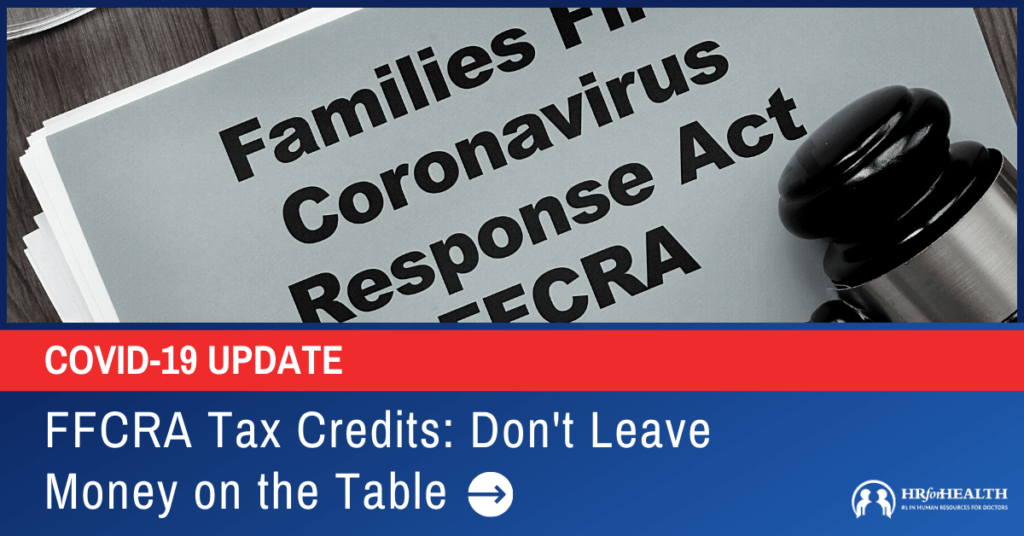The Families First Coronavirus Response Act (FFCRA) mandated extended sick leave and family leave to deal with the demands of COVID-19. This act provided necessary relief to employees fighting the illness themselves or taking care of loved ones who were suffering.
The government has provided financial relief for companies that must offer this leave, but you may have misconceptions about reimbursement. If your practice falls under FFCRA provisions, you need to file the appropriate paperwork soon or miss out on the funding that you are due.
FFCRA Basics
President Trump enacted the FFCRA on March 18, 2020. The act applies to certain public employers and private employers with fewer than 500 employees. Benefits for federal employees and some companies with fewer than 50 employees may fall under different provisions.
The provisions of FFCRA include the following:
- Two weeks (up to 80 hours) of paid sick leave at their regular rate when the employee is quarantined due to COVID-19 exposure or is suffering from COVID-19 symptoms while waiting for a diagnosis.
- Two weeks (up to 80 hours) of paid sick leave paid at two-thirds of the regular rate when the employee cannot work due to caring for someone in quarantine or for a child whose school or child care facility is closed due to COVID-19 or other similar conditions.
- Up to 10 more weeks of paid expanded family and medical leave at two-thirds the employee’s regular rate of pay when a worker who you have employed for at least 30 days cannot work because they must care for a child whose school or daycare has closed due to COVID-19 factors.
Reimbursement Measures
The following credits are available for employers who are eligible for FFCRA tax credits:
Employee Retention Credit
Some employers may not understand all the steps needed to claim COVID-19 tax reimbursements. That means you could be in danger of missing out on federal funds, especially since the government recently updated the guidelines. You must fill out the required forms and meet fast-approaching deadlines. You need to complete the following steps:
- Report total qualified leave wages for each calendar quarter, usually on Form 941 – Employer’s Quarterly Federal Tax Return. You can also report qualified wages that entitle you to an Employee Retention Credit that falls under the CARES Act. That means you can report income, Social Security and Medicare taxes that you withheld from your employees’ wages and also your share of Social Security and Medicare taxes. Keep in mind that wages for the Retention Credit do not include wages paid towards FFCRA in which you received a tax credit for.
- Before keeping the tax deposit money meant for the IRS, you may defer the deposit and the payment of your part of the Social Security tax as authorized by section 2301 of the CARES Act. The IRS explains this process in detail on their website. You may also decide to defer your employees’ share of the Social Security tax by using Notice 2020-65 on some wages you paid between September 1, 2020, and December 31, 2020.
Deadlines
The end of the year is near, and IRS deadlines are looming. COVID-19 patients have overwhelmed many providers and created an avalanche of paperwork. Do not overlook your tax credits in the confusion.
How HR for Health Can Help
Your head must be spinning over all the rules and regulations that COVID-19 has left in its wake. Doctors, dentists and other providers have many new duties. That’s why contacting HR for Health can help. They can provide important information about FFCRA and other government measures so you get all your tax credits. And the experts at HR for Health will answer your questions in 24 hours or less. The end of the year is near. Reach out today and schedule a call here.
Did you know that we at HR for Health monitor all the specific laws and regulations that affect your practice? If you have questions about compliance issues, please reach out to us. Schedule a call, call (877) 779-4747, or email [email protected] now to learn more.
HR for Health is one of the nation’s leading Human Resources Management Systems (HRMS) used by small to mid-sized practices.
Quick note: This is not to be taken as legal or HR advice. Since employment laws change over time and can vary by location and industry, consult a lawyer or HR expert for specific guidance. Learn about HR for Health’s HR services.


